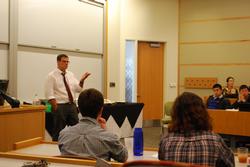News
Election think tank offers insight
By Kevin Welsh '15
November 1, 2012
With a bit more than a week until the election, the Levitt Center dedicated last Friday’s Think Tank to the 2012 presidential race.
Professor of Government Phil Klinkner gave the short talk, framing the election in terms of critical short term issues with a direct impact on this election, and some longer-term issues that he expects will play out beyond Nov. 6.
“Most voters come into elections with a clear idea of who they will vote for already,” Klinkner said, “and if they aren’t, it’s the economy that will sway them one way or the other. But, it’s the economic situation from earlier in the year, not the situation this week or this month, that voters are basing their opinions off of.”
Klinkner supports the idea that voters base their opinion of candidates off of perceived change in their individual quality of life under the incumbent. But, he contented, voters tend to look back only six months, maybe a year. People think in the short term about the economy, so despite the questionable performance of President Obama’s economic plan in the beginning of his term, the current improvement in the economy will be what matters most to voters. The economy’s improvement in recent months will reflect well on Obama in a way that might sway voters to his camp.
In discussing the long term, Professor Klinkner described a demographic issue that is facing the Republican party. Currently, the Republican party has a large bloc of older voters. While attempts have been made to bring Latino voters over to the Republican party, such attempts have, by most accounts, failed. The party is now faced with a voting bloc that is increasingly aging out.
In contrast, Democrats have taken younger voters and the majority of both Black and Latino voters to their side, assuring the party a long future of committed voters, even if their short term goals do not pan out.
Professor Klinkner also made note of the increasing polarization of the party platforms, suggesting that both sides will move the United States election into a new era of campaigning. Typically a campaign either seeks to convince new, independent voters to vote for a specific party, or tries to “activate” those voters who are already committed to a given party, but need a reminder to go out and vote. As the parties become more polarized, Klinker said, it will be harder to sway independents and “partisan activation” will become a central feature of successful campaigns.
When asked about who may win the election, Klinkner was coy. He did admit that President Obama currently had a slight lead in the polls and looked to be the winner, but he said he wouldn’t be surprised if Romney pulls ahead.
If you’re interested in joining the government department for a spirited election party next Tuesday feel free to stop by Sadove for the nail biting conclusion to a so far riveting election season. And if for no other reason, you can come see Professor Klinkner “geek out on election returns” as they come in live.

No comments yet.
Comment Guidelines
Please log in to post a comment